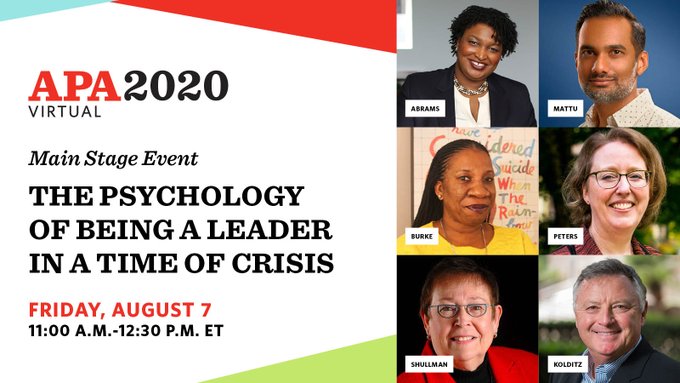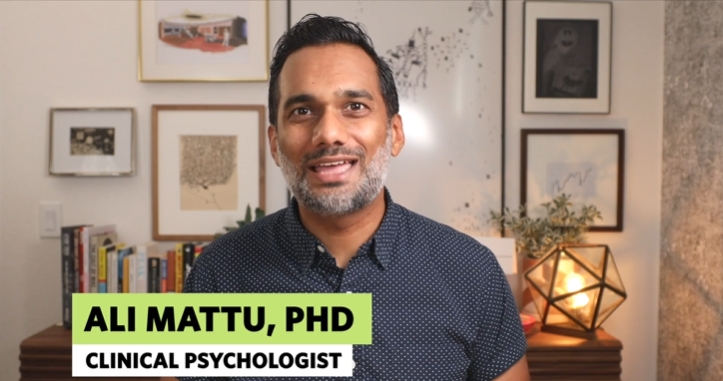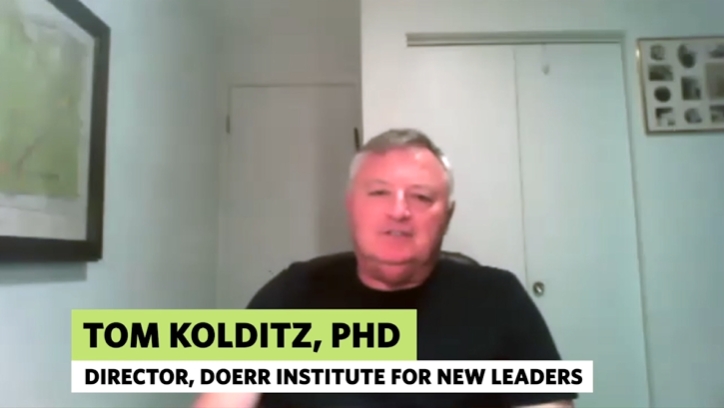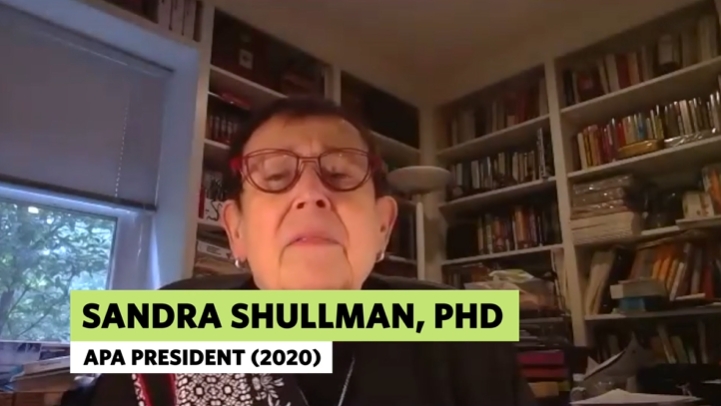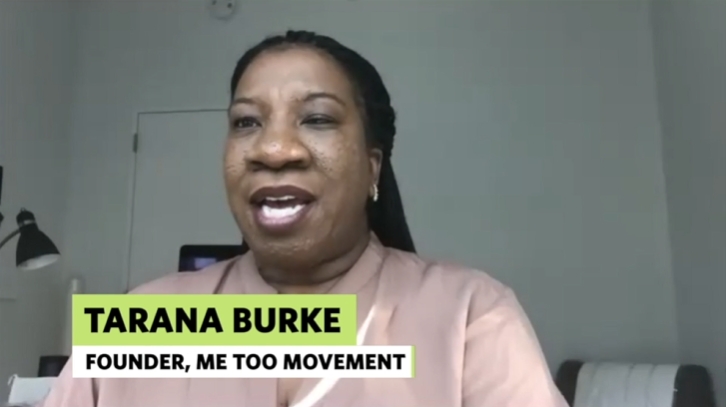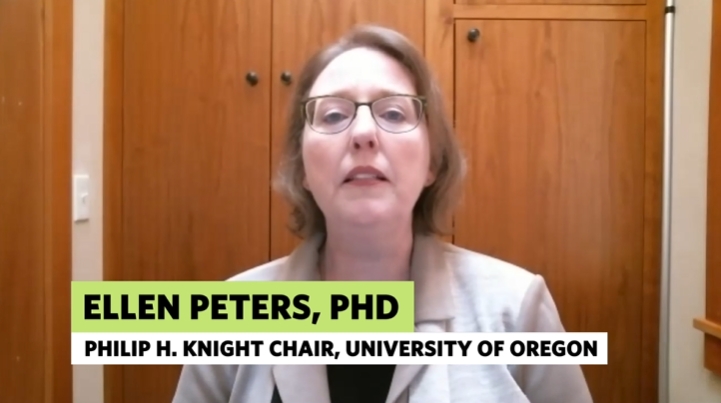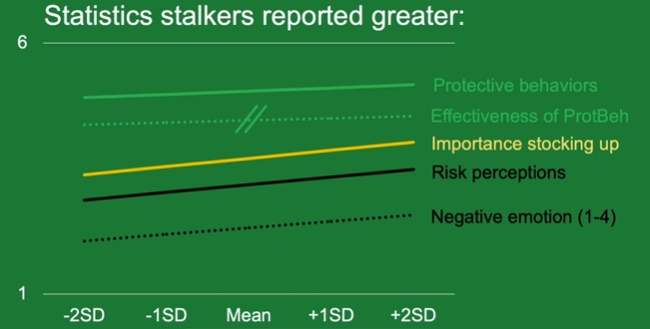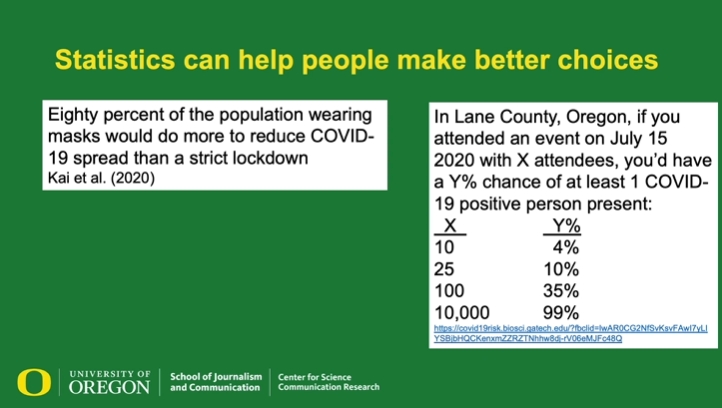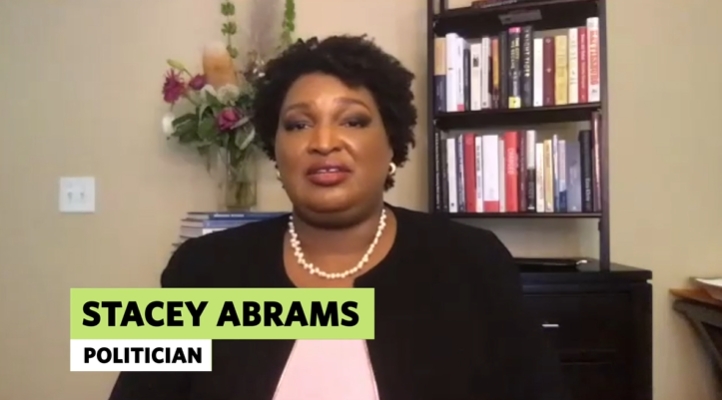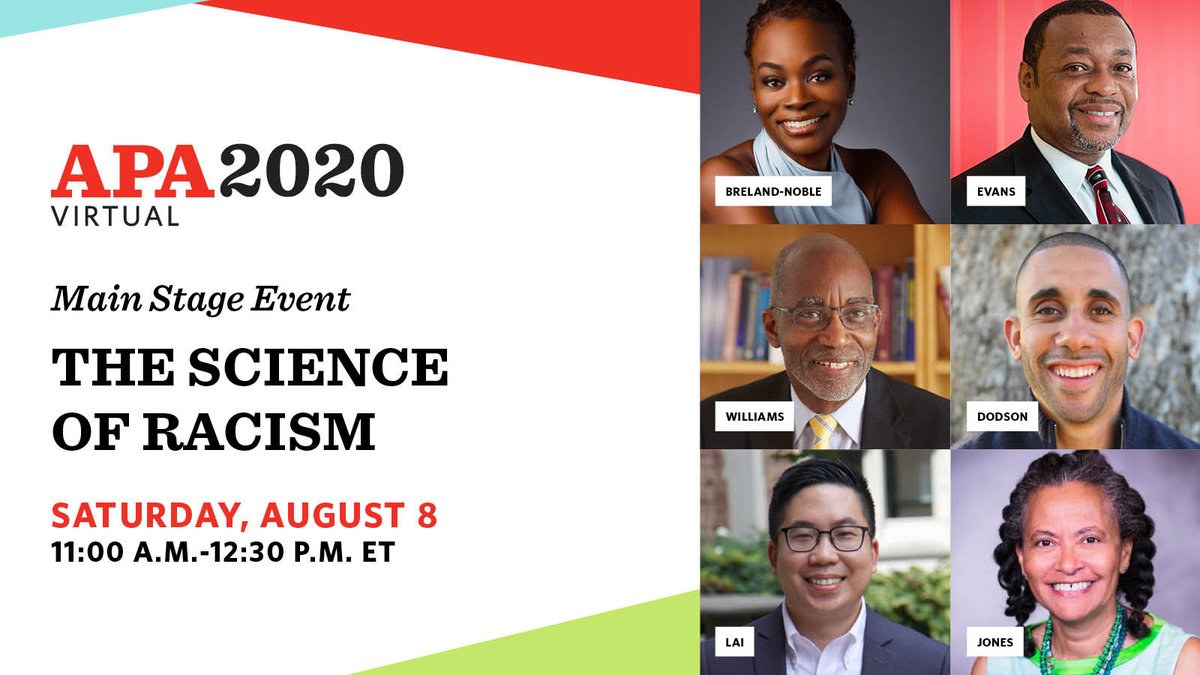Welcome to today’s #APA2020 Virtual main stage event, The Psychology of Being a Leader in a Time of Crisis, hosted by @amyewalter.
Today’s first guest is cognitive behavioral psychologist @AliMattu, who will share lessons that he has learned about leadership during the uncertainty of the #COVID19 pandemic. #APA2020
When #COVID19 struck his former hometown of New York City, @AliMattu reached out to colleagues and found many were looking for guidance during the pandemic. He then started making YouTube videos based on the needs they expressed. #APA2020
“Leadership is not about talking. Leadership is about listening…about understanding what are the pain points of the community or organization you serve.” -- @AliMattu #APA2020
“I had no idea that graduating high school and college students were so struggling with graduating during a pandemic. But so many of my colleagues kept mentioning that as an issue that was coming up.” -- @AliMattu #APA2020
“Distill everything you say, do, and practice into a simple, compact, flexible, idea. During a crisis no one has the bandwidth to remember or think through complex ideas.” -- @AliMattu #APA2020
“In a crisis, your plans are going to fail, you’re not going to know what path to go down. In these moments, you have to remember your mission. The stuff that gives your life meaning. It can guide you through the chaos.” -- @AliMattu #APA2020
Dr. Tom Kolditz has spent time studying soldiers in Iraq, sky diving teams, and climbing guides on Mount Everest. He joins us today to explain what his research can teach us about effective leadership in extreme contexts. #APA2020
"The fundamental element of a dangerous situation is uncertainty. All of us can handle what we know is coming. The challenge we face now is we don’t know." -- Dr. Kolditz #APA2020
“The effectiveness of leaders in dangerous contexts is based almost entirely on trust. And that makes sense, if you’re dealing with uncertainty the only real leverage you have as a leader is for people to trust you, they trust what you say.” -- Dr. Kolditz #APA2020
“Leaders who were good in these circumstances understood that people were already upset…they were particularly good at calming people down, not injecting more emotion, especially fear or anger.” -- Dr. Kolditz #APA2020
“When people are afraid, social capital disappears and the focus is almost entirely on the competence of the individual and the degree to which they are loyal to others. A selfish individual, in a dangerous context, can’t be trusted.” -- Dr. Kolditz #APA2020
"Reduce status differentials and show kindness to people around you. By doing that, you’re communicating that their lives matter and their circumstances will be taken into account when you make decisions." -- Dr. Kolditz advises leaders during the #COVID19 crisis #APA2020
“If you want people around you to be calm, and to not become angry or fearful, you have to model that behavior. As soon as you stop doing that, you lose credibility and you lose trust. And once it’s gone, it’s very difficult to restore it.” -- Dr. Kolditz #APA2020
Up next is current APA President @sandyapa2020 to talk about how effective leaders in the workplace can help us transition to the new normal of #COVID19.
. @amyewalter: What can psychology teach us about dealing with a crisis?
@sandyapa2020: First and foremost, focus and purpose. In a crisis, people are flooded with new and strange stimuli that can be overwhelming. #APA2020
@sandyapa2020: First and foremost, focus and purpose. In a crisis, people are flooded with new and strange stimuli that can be overwhelming. #APA2020
Leaders can help by expressing humanity and being a relatable person. “We’re all in a learning situation, all of us are doing this imperfectly, but we can get through this together.” -- @sandyapa2020 #APA2020
“One of the things that good leaders understand is that people will develop more capacity to cope with an ongoing crisis if you help them work with you as opposed to just telling them what to do.” -- @sandyapa2020 #APA2020
“We haven’t used the full capacity of virtual connectivity – part of that is the technology is still developing, and part of that is we haven’t even used the capacity of what’s already there.” -- @sandyapa2020 #APA2020
“Leaders doing this virtually have to listen more and create more check-ins where they are giving more support.” -- @sandyapa2020, on how leaders can avoid leaving behind team members from marginalized groups. #APA2020
“One of the biggest challenges right now is that people feel that they can’t get away from work because it’s 24/7 accessibility. I think really successful executives inspire you to get your best done and inspire you to do your best with your families.” -- @sandyapa2020 #APA2020
“People are not going to trust you as a leader unless you trust them as colleagues. When you are working virtually and remotely as a leader, you can’t be micromanaging all the time.” -- @sandyapa2020 #APA2020
Up next is #MeToo  movement founder and social justice activist @TaranaBurke to share her thoughts on leading as a human being during this moment of #COVID19 and racial reckoning.
movement founder and social justice activist @TaranaBurke to share her thoughts on leading as a human being during this moment of #COVID19 and racial reckoning.
 movement founder and social justice activist @TaranaBurke to share her thoughts on leading as a human being during this moment of #COVID19 and racial reckoning.
movement founder and social justice activist @TaranaBurke to share her thoughts on leading as a human being during this moment of #COVID19 and racial reckoning.
"In a time when I thought I needed to take a step back, it really was a moment for me to take a step forward. It became a moment to bring a gender lens and a sexual violence lens into the conversation. It became clear that’s the role I need to play." -- @TaranaBurke #APA2020
“If you are Black, and a woman, and a mother...all of this matters in this moment. What leadership has looked like to me is being able to adjust to help people understand that.” -- @TaranaBurke #APA2020
“My work is predicated on hope. There is no way to do what I do and what others do every day without being grounded in a belief that we can be better, that we can do better. Sometimes when you are in a moment like this that hope feels really small.” -- @TaranaBurke #APA2020
“It’s important to remember (Civil Rights leaders John Lewis and C.T. Vivian) as humans because it is human beings who are out here protesting in the street. These are everyday people who get up, go to work, feed their families…” -- @TaranaBurke #APA2020
“I think it’s really important for people to know about what leadership looks like -- it has to be human.” - @TaranaBurke #APA2020
“Trauma halts possibility, but movement activates it. I believe in movement. I believe in the power of the collective will of the people.” -- @TaranaBurke #APA2020
“You don’t have to be protesting in the streets. You don’t have to be on the front lines. But you do have to be active. The thing that is beautiful about this moment is that we can all contribute in large ways or small ways.” -- @TaranaBurke #APA2020
Welcome @ellenpetersjdm to the #APA2020 Virtual Main Stage! Dr. Peters is an expert in decision making and science communication. She joins us to discuss how our leaders can use statistics to encourage healthy behaviors during the #COVID19 crisis.
“Our chances of emerging successfully from #COVID19 depend in part on our abilities to act on statistics about the pandemic itself, and also how to mitigate it, how to take protective behaviors.” -- @ellenpetersjdm #APA2020
Is tracking #COVID19 statistics helpful? On one hand, knowledge is power - “stalking the statistics” may result in adopting safer behaviors. On the other hand, repeated exposure can raise anxiety levels, distorting our risk perception.
The x-axis shows levels of “statistics stalking”, increasing from left to right. People who tracked statistics more reported more negative emotions toward #COVID19 - they also perceived more risk from the virus and took more protective behaviors.
“As individuals and as a nation, we can use statistics on infection rates and deaths to choose when to double down on mitigation efforts like physical distancing and wearing masks, and when we need to really stock up on hospital supplies.” -- @ellenpetersjdm #APA2020
. @ellenpetersjdm: Leaders in the #COVID19 crisis can “lead with evidence” by identifying communication goals, being transparent, and providing statistics in an evidence-based manner. #APA2020
Today’s final speaker is @staceyabrams, who joins to discuss leading from the outside and building resilience in times of crisis — regardless of the position you hold. #APA2020
“Whether you are trying to solve a customer’s problem, or a constituent issue or solving a societal conversation, asking ‘How can I help?’ is the way to start effective leadership.” -- @staceyabrams #APA2020
“We’re told sometimes that we’re imagining things, that it’s not that hard. If you just did it right or tried harder, it would work. Those are often protestations that come from people who have never had non-normative experiences.” -- @staceyabrams #APA2020
“There are specific impediments for young people, and specific impediments for people of color. When you intersect those two, we find that is one of the most effective dissuasion techniques for participation in our elections.” -- @staceyabrams #APA2020
“Voter suppression isn’t just about blocking the door, it’s about making the hurdle so high that jumping doesn’t seem worth it.” -- @staceyabrams #APA2020
“In this moment of George Floyd, Ahmaud Arbery, Rayshard Brooks, Breonna Taylor, and Tony McDade where we see protests in the streets, part of our responsibility is to acknowledge the legitimacy and the power of their anger.” -- @staceyabrams #APA2020
“I had to remind myself that it wasn’t just about getting the title. It was about engaging voters who had never been engaged before. It’s about lifting up issues that too often are unmentioned.” -- @staceyabrams #APA2020
“Resilience isn’t about always being successful. It’s about being able to find those moments of success, of growth, of change, and incorporate that into who you are.” -- @staceyabrams #APA2020
Thanks for joining us for today’s #APA2020 main stage session. Join us again tomorrow at 11am ET for The Science of Racism.
Don’t forget, you can still register for access to all of our scheduled & on-demand sessions: https://on.apa.org/3a5Jxnx
Don’t forget, you can still register for access to all of our scheduled & on-demand sessions: https://on.apa.org/3a5Jxnx

 Read on Twitter
Read on Twitter